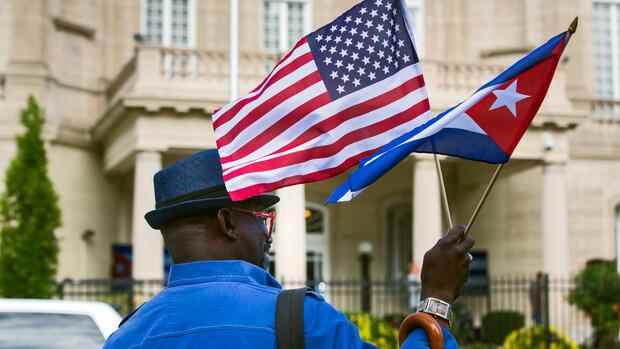The US government recently announced that it would allow direct flights between the US and Cuba again.
(Photo: dpa)
Bogota Cuban experts welcomed the announced partial lifting of US sanctions against the communist Caribbean island with relief. Dhe economist Pavel Vidal described the developments as a “positive political signal”. “It is the beginning of a new thaw between Havana and Washington,” he underlined.
The economic impact is likely to be limited, said Vidal, who teaches at Xaveriana Catholic University in Colombia and previously worked at the Central Bank of Cuba. “But Cuba’s economy is so devastated that any relief is welcome and a help.” The island’s private sector benefits above all, where 15 percent of the economically active population works in restaurants, hotels or small businesses such as nail salons .
The simplifications only had a really big effect if they were followed by further flexibility from both sides, emphasized Vidal. Now the government in Havana must push ahead with the economic reforms.
The US government surprisingly announced on Monday that it would again allow higher transfers from Cubans living in the US to the island and increase the limit to $1,000 per quarter. Direct flights between the US and several Cuban cities should be possible again. In addition, educational trips by US citizens to the island are permitted again. the kThe Cuban private sector is also said to have access to US internet financial service providers and e-commerce platforms.
Top jobs of the day
Find the best jobs now and
be notified by email.
However, companies with ties to the Cuban government or military that are on the sanctions list are excluded. Economist Vidal was pleased. “Access to the US financial market for private entrepreneurs is an interesting and really new step.” Now it remains to be seen how the implementation can work in practice.
Obama tried to improve relations with Cuba.
(Photo: AP)
The Cuban ex-diplomat Carlos Alzugaray said the relief are “the first clear indication that US President Joe Biden wants to fulfill his campaign promises in relation to Cuba and is reversing his predecessor’s sanctions policy”. 2015 had dhe then US head of state Barack Obama heralded the improvement of relations with Cuba. He spoke of a “fresh start after decades of distrust”, relaxed travel restrictions for Cuban exiles and regulations on money transfers.
At the 2015 America Summit in Panama, there was a first direct conversation between Obama and Cuba’s then President Raúl Castro. Obama had the country removed from the US terror list, restored diplomatic relations and reopened the diplomatic mission in the Cuban capital through Secretary of State John Kerry.
Many Cubans want to leave the country
Obama’s successor Donald Trump ended this policy of detente in 2017 and put Cuba back on the US list of “terror states”. In addition, under Trump, the United States made it more difficult for US Cubans to transfer dollars to their families at home, known as “remesas”.
Vidal and Alzugaray suspect that the current rapprochement is essentially driven by US domestic politics. Due to the disastrous economic situation in Cuba, more people are currently leaving the island than ever before – and the destination of the vast majority is the USA.
>>Read here: Comprehensive economic reform decided: Cuba dares more capitalism
According to U.S. Customs and Border Protection, nearly 115,000 undocumented Cubans immigrated to the United States across the Mexican border in the seven months between October 2021 and April this year. That was three times more than the full year from October 2020 to September 2021.
Rafael Hernández, director of the Cuban magazine Temas, agrees with Vidal and Alzugaray. The US package of measures corresponds neither to the logic of human rights nor to the importance of Cuba for Washington. The relief obeyed the dynamics of migration, which “poses a national security problem for the United States”. In essence, it is about “stopping the migration crisis”. However, in order to get the Cuban government to cooperate on this issue, Washington must “reverse the harassment of the past five years,” stresses Hernández.
More: How Russia is waging its propaganda war in Latin America
